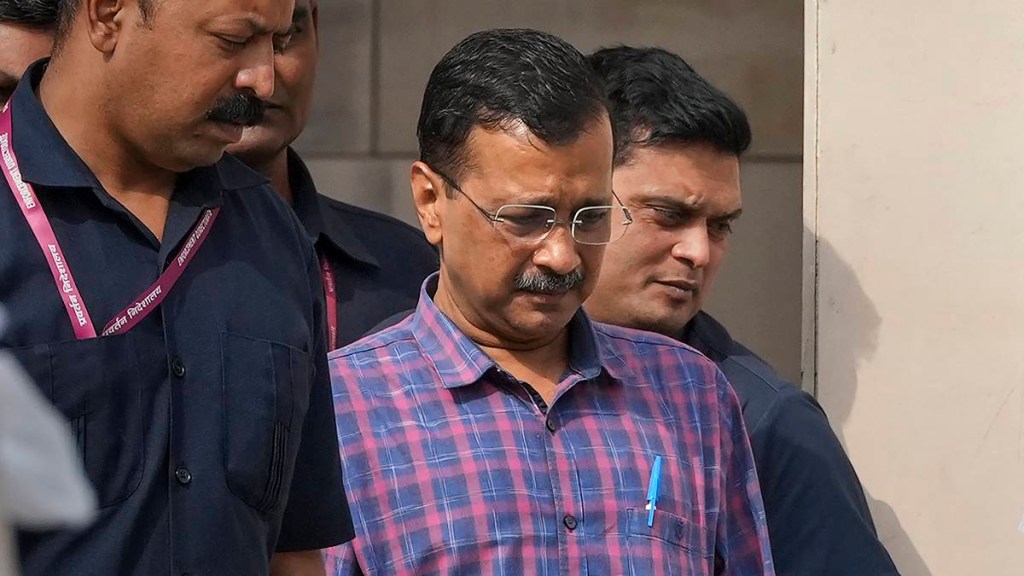In a significant setback to the Aam Aadmi Party, the Delhi High Court on Tuesday rejected the plea filed by Chief Minister Arvind Kejriwal challenging his arrest by the Enforcement Directorate in the excise policy case. Kejriwal, currently in judicial custody till April 15, had also challenged a trial court’s order remanding him to ED custody. The verdict was reserved on April 3 after a detailed hearing by the court.
A single-judge bench of Justice Swarana Kanta Sharma said that the ED had managed to place enough material on record along with statements of approvers and AAP’s pwn candidate substantiating that Kejriwal had given money for the Goa Assembly elections. The judge noted that the chain of money transfer had been established and that the material collected by ED revealed that Kejriwal was involved in “conspiring”, “demanding kickbacks” and “use and concealment of proceeds of crime”.
‘Kejriwal used, concealed proceeds of crime’
The Delhi High Court, while pronouncing the verdict, said that the ED’s findings have revealed that Arvind Kejriwal was actively involved in the use and concealment of the proceeds of crime. “Material collected by ED reveals that Kejriwal conspired and was involved in formulation of excise policy and used proceeds of crime. He is also allegedly involved in personal capacity in formulation of policy and demanding kickbacks and secondly in the capacity of national convenor of AAP,” the judge said while pronouncing the court’s order.
The bench further noted that the ED had placed enough material that completes the chain that shows money was sent to Goa elections.
‘Casting aspersion on judicial process’
In the course of the hearing, Kejriwal’s counsel had questioned the veractity of statements given against Kejriwal by approvers. The cousel argued that the statements were given in exchange for their release and ticket to contest elections. In its order, however, the court made it clear that approvers’ statements are recorded by the court and not by the probe agency.
“To cast aspersion on the manner of recording statements of approver would amount to casting aspersions on the judicial process. The law of approver is more than 100 years old. It is not a one year old law to suggest as if it was enacted to falsely implicate the petitioner,” the judge said in the order, adding that who gives tickets for contesting election or who purchases electoral bonds is not the concern of the court.
‘Challenge on ground of timing of arrest not sustainable’
During hearing, Kejriwal’s counsel Abhishek Manu Singhvi had argued that the former was arrested by the ED to disrupt his campaign ahead of the Lok Sabha elections. The court, however, dismissed the argument, stating that the challenge to the timing of arrest in the absence of any mala fide on the ED’s part was not sustainable.
“Petitioner has been arrested in money laundering case and court has to examine his arrest and remand as per law irrespective of timing of elections,” the court noted.
‘Not for accused to decide how investigation is done’
Kejriwal, through his counsel, had also argued that the Chief Minister could have been questioned through video conferencing. However, Justice Sharma rejected the contention and stated that it wasn’t for the accused to decide how the investigation was to be done.
“It is not for the accused to decide how the investigation is to be done. It cannot be as per the convenience of the accused. There cannot be any specific privilege for any one including the Chief Minister,” the court said.
Arvind Kejriwal was arrested by the ED from his residence in Delhi on March 21 in a money-laundering case linked to the Delhi excise policy 2021-22. He was produced before Delhi’s Rouse Avenue Court, which remanded him to ED custody till March 28. Kejriwal subsequently challenged his arrest and remand before the High Court.
Following the High Court’s judgment, the Aam Aadmi Party said it disagreed with the verdict and would challenge the order in the Supreme Court. According to The Indian Express, the AAP may move the apex court against the HC’s order on Wednesday, April 10.

